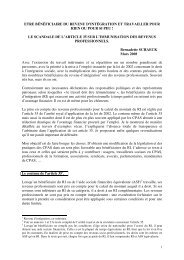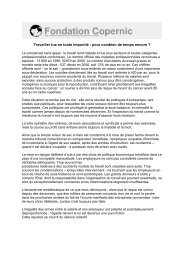Awra Amba RJ 300612 EN - Contacter un comité local d'Attac
Awra Amba RJ 300612 EN - Contacter un comité local d'Attac
Awra Amba RJ 300612 EN - Contacter un comité local d'Attac
You also want an ePaper? Increase the reach of your titles
YUMPU automatically turns print PDFs into web optimized ePapers that Google loves.
<strong>Awra</strong> <strong>Amba</strong>, a current experiment of utopian socialism<br />
supernatural, and <strong>un</strong>der the constraint to prepare his life beyond life. <strong>Awra</strong> <strong>Amba</strong> appears as a<br />
refreshing alternative, offering a utopia on Earth.<br />
The <strong>Awra</strong> <strong>Amba</strong> experiment does not aim at transforming the Ethiopian society through a political<br />
revolution, nor through a reformist top down action. It aims at creating, through the initiative of<br />
citizens, a co<strong>un</strong>ter-society, an ideal comm<strong>un</strong>ity which transforms effectively a small part of the<br />
society into a "paradise on Earth" as said by the comm<strong>un</strong>ity. Children rights, education, gender<br />
equality and simply equality, lack of religion, honesty, brotherhood, solidarity are not only claimed<br />
but also implemented. These values play a central role, as well as the permanent reminder of their<br />
objective: peace and harmony between humans. They are not only guidelines guiding the action, but<br />
everyone's lifestyles and behaviours are in line with them. The behaviour changes are first of all<br />
thought and implemented at the lowest level, i.e. of the people, the family and the village. In addition<br />
<strong>Awra</strong> <strong>Amba</strong> is very far from the cultural and religious Ethiopian standards; it is marginalised and<br />
looked upon as social deviants by neighbouring comm<strong>un</strong>ities, but cited as an example by the<br />
authorities. It is therefore both a co<strong>un</strong>ter-society and maybe an image of the future Ethiopian society.<br />
Therefore, it is really an experiment of utopian socialism, in line with Robert Owen in Great Britain<br />
or Saint-Simon and Charles Fourier in France, of which we gave some examples in the introduction<br />
among h<strong>un</strong>dreds since the 19 th century. It stands also out from most social movements, because it is a<br />
movement that aims not mainly to convince, but acts and builds a new society.<br />
The transformations made within the comm<strong>un</strong>ity are not the result of an initiative from the national<br />
government, regional authorities, NGOs or an Ethiopian citizen movement, neither of an external<br />
movement of thought – an imported development theory for instance, but an initiative of the <strong>Awra</strong><br />
<strong>Amba</strong> comm<strong>un</strong>ity members themselves (Ya08/121). Therefore, the <strong>Awra</strong> <strong>Amba</strong> experiment<br />
represents an eminently democratic process. According to Jacques Rancière (2005), "the democracy<br />
is the power of those who have no special title for exercising power, i.e. of all". It is a political<br />
system, where sovereignty resides in all the citizens, the power stemming from their collective will<br />
(an analysis of the concept of democracy is given in Joumard, 2011, p. 128-133). <strong>Awra</strong> <strong>Amba</strong> is the<br />
building by a set of citizens of their power on their own life, irrespective of their sex, their age, their<br />
activities, and their skills. They are moreover "ordinary" citizens, nobodies, illiterate people who<br />
took their future in their hands. It is therefore a very accomplished experiment of democracy.<br />
This adventure was initiated by an almost illiterate farmer, who had never read any of the classics on<br />
emancipation, but who met apparently a very small comm<strong>un</strong>ity of very liberal Muslims and had been<br />
without doubt influenced by the socialist ideas of the 60s and 70s. The other fo<strong>un</strong>ders were also<br />
illiterate and the comm<strong>un</strong>ity remains a peasant and craftsmen comm<strong>un</strong>ity, not much in contact with<br />
written work. It could change with the yo<strong>un</strong>g generation quite well educated.<br />
Like all ideal comm<strong>un</strong>ities, which appeared in the course of history, <strong>Awra</strong> <strong>Amba</strong> was built in a<br />
hostile environment. Its beginning was quite violent, in a State with revolutions, famines and wars<br />
with neighbours. All utopian comm<strong>un</strong>ities died or have evolved so deeply that they did not anymore<br />
comply with their initial project (like Auroville in India today for instance). The question of the<br />
sustainability of <strong>Awra</strong> <strong>Amba</strong> is therefore a crucial issue.<br />
Challenges or risks for the future<br />
In our opinion, the situation in <strong>Awra</strong> <strong>Amba</strong> presents a number of risks for its survival or its<br />
development. We see four challenges or risks for the future: endogamy, lack of openness to the<br />
world, heterogeneity, and ossification through the myth.<br />
Endogamy<br />
The withdrawal of the inhabitants into their small comm<strong>un</strong>ity is liable to lead to degeneration or<br />
breakup. After a very strong growth, the comm<strong>un</strong>ity has been experiencing a limited growth since<br />
2006, and seems de facto relatively closed to outside persons. The reasons are the lack of space, that<br />
76 / 85

















